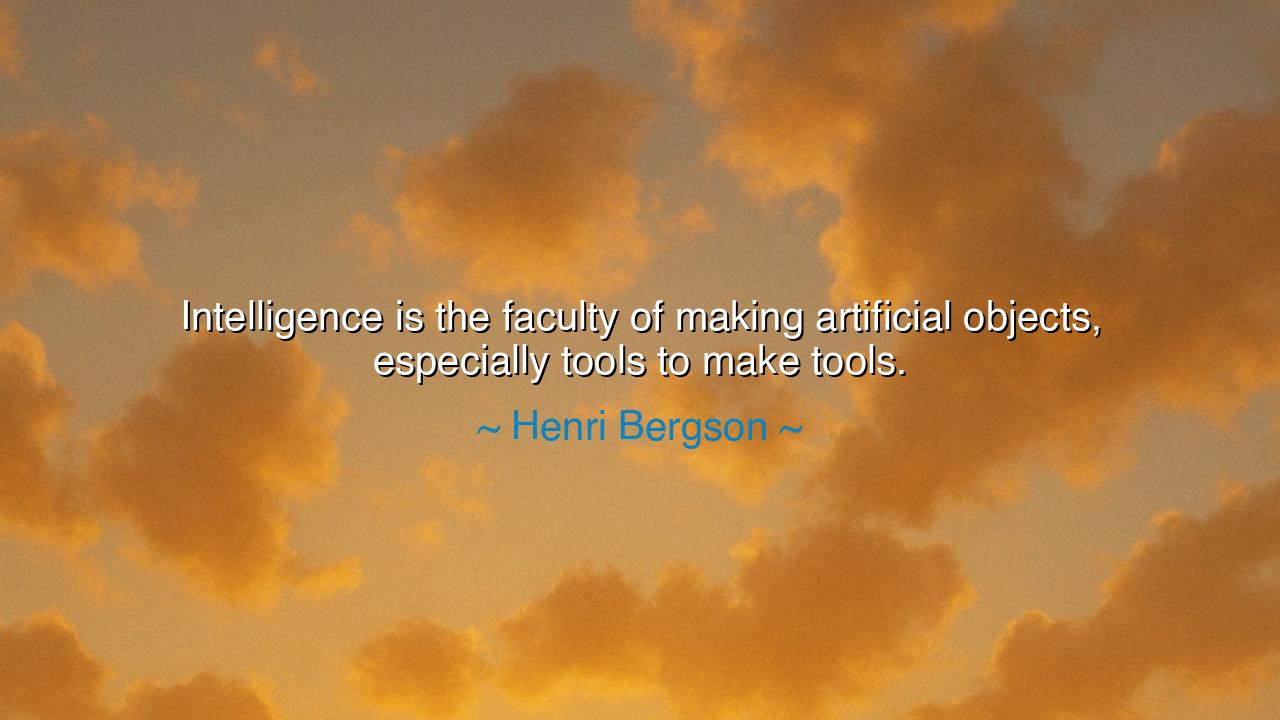
Intelligence is the faculty of making artificial objects
Intelligence is the faculty of making artificial objects, especially tools to make tools.






In the age when philosophers sought to uncover the hidden pulse of life itself, the great French thinker Henri Bergson spoke a truth that shines across centuries: “Intelligence is the faculty of making artificial objects, especially tools to make tools.” In this deceptively simple statement, Bergson revealed the profound essence of human intelligence — not merely the ability to think, but the divine gift to create, to build, to shape the material world according to the designs of the mind. For what distinguishes humankind from all other living creatures is not strength, nor speed, nor instinct, but the sacred fire of invention — the power to fashion not only tools, but tools that create other tools, extending the reach of our will beyond the limits of our flesh.
The origin of this quote lies in Bergson’s great work Creative Evolution (1907), where he sought to understand the nature of life and consciousness. He observed that all living things strive, in their own way, to survive and to adapt. The bird fashions its nest; the spider spins its web; yet only man builds machines, and then builds machines to build more machines. This, he said, is the mark of intelligence — not a passive awareness, but an active force that transforms reality itself. To Bergson, human intelligence is a form of creative energy, an extension of life’s deeper impulse to evolve and transcend its own limitations.
From the dawn of history, this faculty has guided our destiny. When our ancestors first struck stone against stone to create a spark, they were not merely surviving — they were inventing a future. That single act of creation began an unbroken chain of ingenuity that led from fire to the forge, from the wheel to the engine, from the printing press to the computer. Each generation has built not only upon the tools of the last but upon the idea of tool-making itself. This is the meaning of Bergson’s phrase “tools to make tools” — the recognition that human progress is recursive, self-creating, a living flame that grows brighter with every spark of insight.
Consider the story of Leonardo da Vinci, whose mind danced between art and science, between dream and mechanism. He envisioned flying machines, armored vehicles, and intricate gears long before technology could bring them to life. Leonardo understood intuitively what Bergson would later express in philosophy: that intelligence is a force of creation that mirrors nature’s own drive toward complexity. In Leonardo’s sketches — in every line of his designs — we see the divine in human thought: the urge not only to imagine what is not yet real, but to give it form through art, craft, and design.
Yet Bergson’s wisdom carries a deeper message still — a warning, and a hope. For to wield such creative power is to bear great responsibility. The same intelligence that invents the plow also invents the sword; the same hand that builds can also destroy. Humanity’s gift of tool-making has lifted civilizations to glory, but it has also scarred the earth with the marks of greed and war. Bergson’s insight thus calls us to reflection: if intelligence is the faculty of making, then it must also be guided by the spirit of purpose — by moral and emotional wisdom. Creation, without conscience, becomes corruption. The true test of intelligence is not in what it can build, but in what it chooses to build.
In our own age, where machines now build machines that think, Bergson’s words return with renewed urgency. The birth of artificial intelligence — the latest of our “tools to make tools” — is both the triumph and the trial of our species. For now we must ask: will we remain masters of our creation, or servants to it? Will our intelligence elevate the human spirit, or entrap it within its own mechanisms? The ancients spoke of Prometheus, who stole fire from the gods to give it to man — a fire that could warm or destroy. So too must we guard the flame of invention, lest it burn without wisdom.
Let this, then, be the lesson carried forward: True intelligence is not only invention, but intention. To think creatively is divine; to think responsibly is holy. Build, but build with love. Create, but create with compassion. Every act of invention must be a dialogue between the hands and the heart. Let your intelligence serve life, not merely utility; harmony, not conquest. For the greatest of all tools is not the one that shapes the world, but the one that shapes the soul — the conscience that reminds us why we build at all.
And so, as Bergson teaches, intelligence is not a cold mechanism of logic, but a living flame — the breath of evolution itself, passed from mind to mind across the ages. Tend that flame with care. Use it to forge not only the machines of tomorrow, but the virtues that will guide them. For only when creation and conscience walk together can humanity fulfill the true purpose of its intelligence: to become, not the maker of tools alone, but the artisan of destiny.






AAdministratorAdministrator
Welcome, honored guests. Please leave a comment, we will respond soon